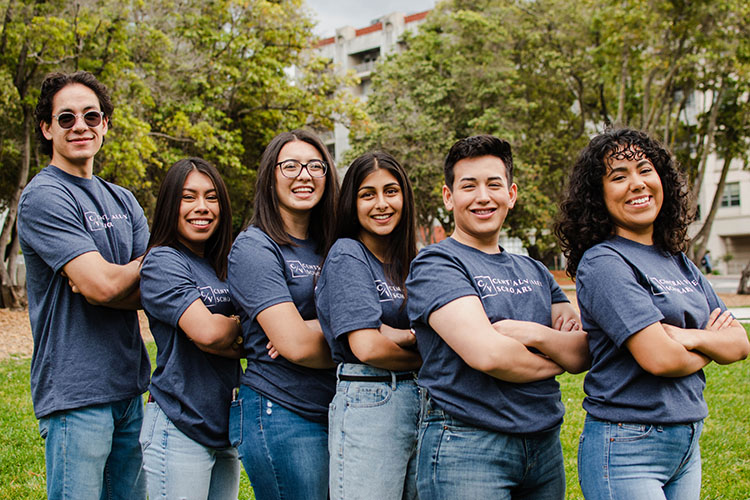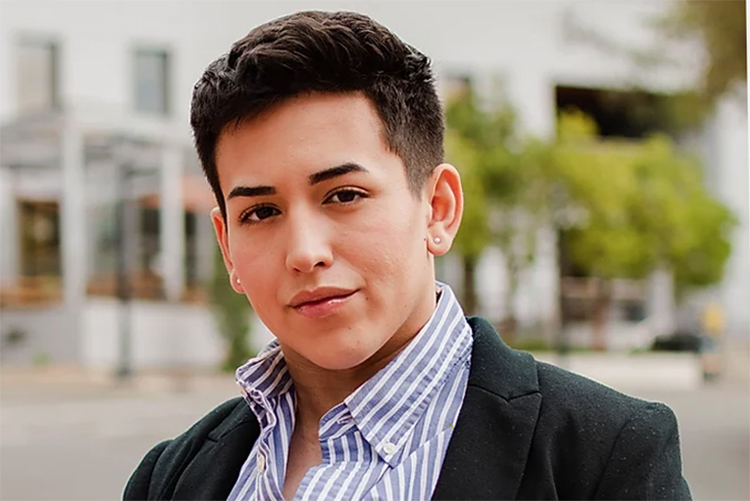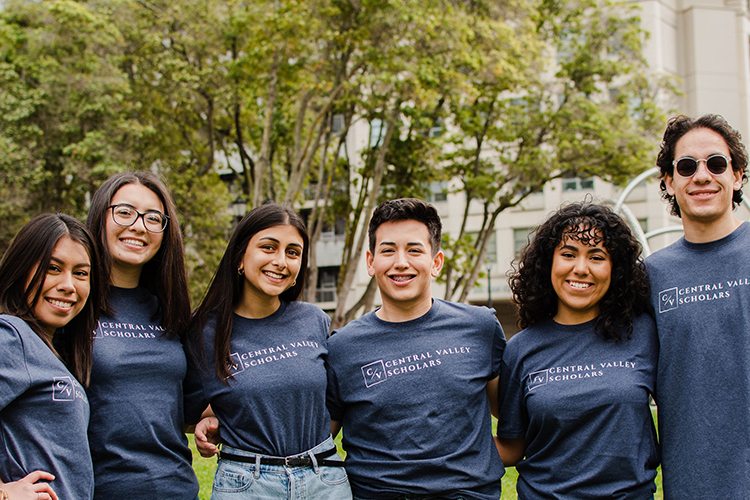Undergrads’ nonprofit preps Central Valley teens for college success
Central Valley Scholars targets bright but under-resourced first-generation, low-income, marginalized high schoolers

June 1, 2020

The staff of Central Valley Scholars, a year-old nonprofit set up by UC Berkeley student Michael Piña (third from right), aims to help the valley’s brightest, yet most marginalized, high school students get on track to attend top four-year universities like Berkeley. (Photo by Mirthica Suganthan)
Growing up in the Central Valley town of Kerman, population 15,000, wasn’t easy for Michael Piña, who self-identified as queer. Piña, who prefers the pronoun “she,” suffered abuse from family, local youth and a Catholic priest who, at a church retreat, “threw holy water at me, trying to get the devil out of me,” she said. “It caused a lot of emotional trauma.”
But in Fresno County, where less than 20% of all residents and less than 10% of Latinx residents have a bachelor’s degree, academically talented Piña dreamed of becoming an attorney. So, one summer, in high school, Piña said she chose “to talk to no one. I focused on summer school and an internship and began to realize it didn’t matter if I was queer. It was time to start being myself.”
In her senior year at Kerman High School, when officials wouldn’t allow Piña to put the quote, “Yes, I dress nice. I wasn’t in the closet this long for nothing,” under her yearbook photo, Piña got an ACLU attorney to reverse the decision. And in class, she outperformed her peers, became one the 2017 school valedictorians and was admitted to UC Berkeley.
“I saw higher education as an escape from the harsh realities at home,” said Piña, the first in her Mexican American family to attend college. “I visited Berkeley and saw how different it was, how open everyone was, and I said, ‘I want to go to a school like this.’”

“Growing up in the Central Valley and growing up queer, I developed a really thick skin in order to survive,” said Michael Pina, who will be a UC Berkeley senior in the fall and is president and founder of Central Valley Scholars. “Then I visited Berkeley and saw how different it was, … and I said, “I want to go to a school like this.'” (Photo by Mirthica Suganthan)
Today, Piña, a sociology major who will be a senior this fall, is not only thriving at Berkeley, she’s simultaneously the president of Central Valley Scholars, a nonprofit she founded in 2019 to help prepare historically underserved and oppressed students in the valley to attend prestigious universities nationwide.
In some parts of the Central Valley, a vast agricultural region that encompasses more than one-third of California and 19 counties, “applying for financial aid, writing personal statements and getting college recommendations isn’t explained in many schools,” said Piña, and the ratio of counselors to students can be more than 500-to-1.
Central Valley Scholars’ 16-member staff, most of them undergraduates from the Central Valley who attend universities that include Berkeley, UC Davis, Stanford, Princeton and Harvard, offers high school students free summer workshops, as well as “themtorships” — a word it finds more inclusive than mentorships. It also annually gives out three $1,000 scholarships, to a first-generation, an LGBTQ+ and an undocumented student.
Teens in the valley have jobs, explains Piña, but their pay often goes to their families, to help with rent and food. There isn’t anything left “for a tutor, to pay for SAT and ACT prep books,” she added, “and many don’t even have internet access or a computer. Education is a right, not a privilege, so our resources are free. We share our knowledge.”
Central Valley Scholars also extends itself by offering high schoolers marginalized by society with a relatable space where they are welcomed, understood and advised by college students who are just a few years out of high school.
“They see that we’re young, and look like them, and we have conversations about taboo topics they can’t talk about at home,” said Anokhi Patel, a Berkeley student from Bakersfield and vice president of Central Valley Scholars. “And we try to be fair, forward, inclusive, diverse and unconventional.”

“It’s heartbreaking that many students from the Central Valley could thrive at any school, but their college essays and recommendations are not as good as they could be,” said Anokhi Patel, a Berkeley student raised in Bakersfield who is vice president of Central Valley Scholars. “We definitely target marginalized students, including people of color, queer and trans students, student parents, formerly incarcerated students, making sure they get the help they need” to access higher education. (Photo by Mirthica Suganthan)
Returning home to surprising support
In her first year at Berkeley, Piña said she quickly discovered the wide gulf between herself and affluent peers whose parents were doctors, lawyers and engineers and who had been groomed for years, both at home and in school, to attend four-year colleges and universities.
“I saw this differentiation,” she said, “and thought, ‘OK, what if I create a system of online workshops and scholarships for students from my community, so they also can attain higher education and attend prestigious schools like Berkeley?”
Despite the discrimination Piña once faced in Kerman, she returned to her high school at the end of Berkeley’s 2019 spring semester to try and collaborate with administrators, in hopes of securing summer workshop space. “They quickly denied me any help at all,” said Piña.
But Piña’s aunt, Maria Piña, offered her a small corner of her shop, C & M Professional Services, in Kerman — “I didn’t have Wi-Fi at home,” Piña said — so that Piña could get Central Valley Scholars off the ground.
“The first two weeks, I was by myself, creating a website, posting my program online and trying to connect with kids from area high schools,” she said. Little by little, through word of mouth and social media posts about Central Valley Scholars, more support surfaced. A Chowchilla sporting goods store owner and his wife donated marketing materials, like T-shirts, hats and banners, for example, and students raised in the Central Valley and attending top universities began contacting Piña to help.
“Eventually,” said Piña, “we had had 70 high school students sign up for the three summer workshops,” which each ran for six hours.

Launched in 2019, Central Valley Scholars offers free summer workshops — this year’s are online, due to the COVID-19 crisis — that advise teenagers from under-resourced communities on how to write impactful college essays, choose a career path, fill out applications for financial aid, and other higher education-related tasks. (Photo by Sierra Perez)
Some of the teenagers worked daily in the fields, so Pina said she “gave them money, picked them up and drove them (to the workshops). I even got changing tables for student parents, activity tables for women who needed to bring their kids, and breakfast.”
Patel said funds raised by and donated to Central Valley Scholars also made it possible for laptops to be given to those with none. “A lot of these kids have passion and drive, but they’re from super-rural towns on the side of the freeway, with nothing there, no internet or phone access,” said Patel. “It’s heartbreaking, knowing they could thrive at any school,” but often lack the know-how and resources to get there.
Among the topics covered by the workshops — the 2020 series began last week, via Zoom, because of the COVID-19 pandemic — are how to apply for federal financial aid and the California Dream Act, how to write college and scholarship essays, how to apply to graduate school and how to be an ally to queer students.
Last year, the nonprofit’s scholarships drew more than 300 Central Valley applicants. Of the students who applied, about 38% had a family income of $24,600 or less; roughly 84% were Latinx and nearly 68% were women. Most were from Fresno County, and about 6.5% were individuals who do not conform to traditional gender roles.
“We will be using this data to hold ourselves accountable in outreaching to black students and students from counties outside of Fresno County,” said Pina, and also to students who do not identify with the gender they were assigned at birth.

“My ultimate goal is to create pathways to higher ed for non-traditional students — first-generation, impoverished, queer, disabled, system- impacted,” said Michael Piña (third from right), founder of Central Valley Scholars, “and for them to access the UCs and the Ivy Leagues and achieve success.” (Photo by Mirthica Suganthan)
Themtors for all
Jordan Ibal, a bright student and recent Kerman High School graduate from a low-income Latinx family, said he benefited from Central Valley Scholars’ themtorships. Since elementary school, Ibal had wanted to attend a four-year university, so last summer, after a few of his older friends spoke highly of their experiences with Central Valley Scholars, he registered.
Piña became Ibal’s themtor — the match was ideal, since, like Piña, Ibal chose to major in sociology — and, said Ibal, “Michael helped me even more than my counselor at school. She gave me advice based on her experience going to a UC and explained what the schools look for in your application. I’d write my essays, and then we’d go to the Starbuck’s in town and review them.”
This spring, Ibal, who will be the first person in his family to get a college degree, was admitted to every school he’d applied to, including UC Berkeley, UC Davis, UCLA, UC Santa Barbara and USC. Ultimately, he decided on UCLA.
“I want to pursue a career where I can give back to others, and in a field like sociology, I know I can apply my knowledge to better the system, in terms of race, ethnicity and sexuality, and help those who need it,” said Ibal. “Michael’s been a big inspiration.”

Last year, the scholarships provided by Central Valley Scholars drew more than 300 applicants. Most were from Fresno County, about 38% had a family income of $24,600 or less, roughly 84% were Latinx and nearly 68% were women. (Photo by Sierra Perez)
Piña’s work with Central Valley Scholars has brought her a themtor of her own — 2009 Berkeley Law graduate Melinda Pilling, who grew up in Tulare County, in the Central Valley, and today is an El Cerrito resident working as head of chambers for Joshua Groban, associate justice of the California Supreme Court.
Pilling said she emailed Piña after reading a July 2019 story about Central Valley Scholars in the Fresno Bee. “I thought it was really cool, what Michael was doing, and that maybe there was some way I could help her,” said Pilling, who continues to advise Piña about law school and career options and connects her to resources for Central Valley Scholars. “Frankly, I don’t know how Michael does it, how she accomplishes everything.”
Piña’s energy for and commitment to paving the way to higher education for Central Valley’s underserved youth isn’t just impressive, it’s infectious, said Ibal.
“Michael said that, once I’m in college, I’m welcome to help with the program. I knew a lot of the staff, they’re only a couple years older than me, and they were comforting and encouraging,” he said. “I could see myself doing that in the coming years.”